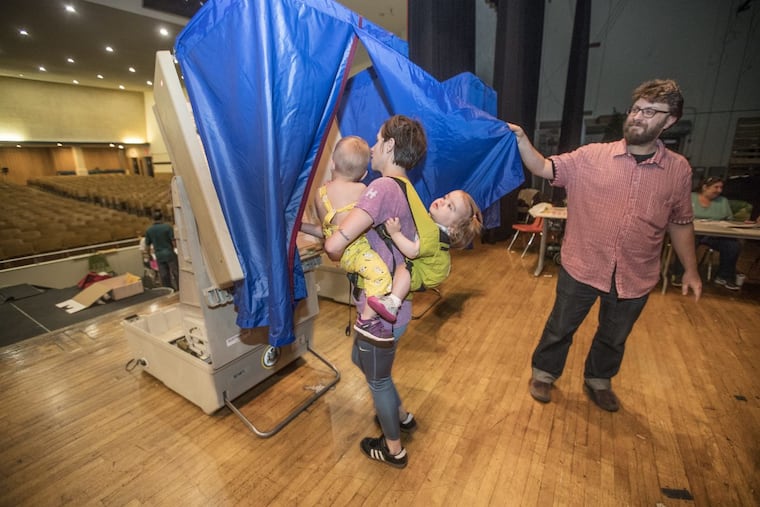Online voter registration in Pa., three years in: More than 1 in 5 voters register online
Allowing voters to register online can save time, increase accuracy of voter rolls, and decrease costs for election officials. It also might bump up turnout, especially for young voters and those who recently relocated.

Whenever Jonathan Marks moved, he said, "the last thing I thought about was updating my voter registration."
That was years ago, before Marks became Pennsylvania's chief elections official — and, yes, now he makes sure to keep everything up-to-date. But his comment speaks to a persistent phenomenon: Americans are less likely to vote after they move, even if it's only a short distance within the same community. Failure to update registrations after moving is one factor that contributes to chronic low turnout, even in hotly contested presidential elections.
For people who have just gone through the chaos, stress, and exhaustion of moving, political scientists say, registration is low on the list of priorities, as it once was for Marks, now the commissioner of the Bureau of Commissions, Elections, and Legislation.
On Thursday, experts from around the country will gather in Philadelphia for an Election Data Summit in advance of the annual conference of the National Association of Secretaries of State. One panel will focus on attempts to modernize the registration process.
One popular solution in recent years is online registration. Although there are promising signs that it can help officials maintain more accurate voter rolls, decrease costs, and maybe — just maybe — increase voter turnout, experts say it alone can't make a huge difference for voter participation. But if people can be persuaded that voting is important, any steps to smooth the path to registration and voting will help.
"That's how I think a lot of these reforms work. They're an added tool," said Michael J. Hanmer, a government and politics professor at the University of Maryland who specializes in elections and voting behavior. "And it's really [about] how they can use that to get to the people who weren't going to do this anyway, otherwise it's lots of people who were going to register anyway."
Arizona implemented the nation's first online voter registration system in 2002, followed by Washington state in 2008. Since then, 35 other states and Washington, D.C., have done so. Pennsylvania began accepting online registrations in August 2015; New Jersey is one of the few holdouts, but it soon will have "automatic voter registration" at Motor Vehicles Department offices.
In its first three years, online voter registration in Pennsylvania has been used more than a million times to register new voters or update information. About 22 percent of registrations or changes were made online, according to data provided by the Pennsylvania Department of State. In Philly, just under 15,000 applications have been processed online.
Besides convenience, online registration has helped improve the accuracy of voter rolls and decreased costs, Marks said. Mistakes that can be made on paper forms — missing a number on a zip code, skipping a field — can't happen with the online form. If you don't fill in the box, you can't submit the registration. Plus, there's no chance of election officials misreading your handwriting.
"It's good news for election administrators," Marks said. "It's certainly good news for voters who are submitting their applications."
The number of provisional ballots has fallen in recent years, Marks said, and his office is studying the data to see how much of that can be attributed to more accurate voter information thanks to online voter registration.
Much of the savings occurs at the county level, where elections are run, but Marks said the Department of State's budget for printing paper forms has dropped by tens of thousands of dollars. As in other states, county officials report lower costs for supplies and personnel, because overtime and expanded staff are not as necessary during times of peak registrations.
Less clear is how online voter registration changes the electorate, which across the country is older, wealthier, and more educated than nonvoters.
The few studies of online voter registration generally suggest it can increase registration and turnout by a few percentage points, particularly among young Americans and those who have recently moved.
That can be significant, given that turnout figures often are low; in fact, only one in six registered Philadelphians actually voted in May's primary election. A few percentage points can swing an election.
One study found that online registration increases totals by only about one percentage point, with essentially no effect on overall turnout, but that it was concentrated among the poorest and least-educated voters. A 2010 study of Arizona and Washington state found that online registrants are younger and more likely to vote once registered, and unpublished research from Jinhai Yu, an economics professor at Shanghai University of Finance and Economics, found that online registration boosts the youth vote in presidential election years by about 3 percentage points.
"Even [if] the change seems statistically small, it can be a large change for policymakers," Yu wrote in an email. "If policymakers place a high value on increasing turnout of young voters," then online registration "may be a particularly effective tool."
As advocates push for additional changes to make voting easier and more accessible — and Gov. Wolf calls for changes including automatic registration at the DMV and registration on Election Day — experts said they need to be carefully designed. Any change that makes things easier is welcome, Hanmer said.
"It's a worthwhile policy if it opens those doors," he said. "If people choose not to walk through it, that's one thing, but I think you can place some measure of success on moving the process toward one where the government is more encouraging of participation from its citizenry."